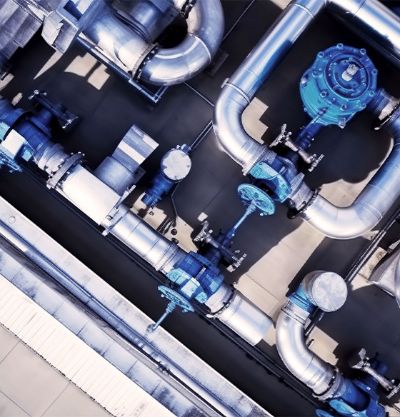Connect on LinkedIn
Key Facts at One Glance:

Extremely hot or cold, corrosive chemicals, persistent odours – seals are meeting harsh conditions in the processing industry. Experts are required. Using the right materials and shapes requires a great deal of expertise, yet it pays off. Which seals are the right ones to maximize the safety in the process industry? Which admixture will fit where - and stay there?
Extreme operating conditions are the standard of the demanding process industry. The choice of sealing materials for the process industry is most important for operational efficiency and safety. Processing equipment faces numerous tasks from fluctuating temperatures to exposure to aggressive chemicals. It requires advanced sealing solutions providing exceptional resistance in harsh environments.
The longevity of seals is essential: Maintenance work at standstill systems are causing high costs. The use of high-quality seals is therefore worthwhile. The question to be addressed: Which material is most suitable for which case?
1. Extreme temperatures
The processing industry often operates in extreme temperatures - from cryogenic conditions to high-temperature environments. Resulting problems include thermal expansion and contraction affecting conventional seals.
2. Chemical resistance
Many aggressive chemicals are a persistent hazard in the process industry. Seals resisting corrosive substances without losing their properties are needed. Seals need to withstand intensive CIP/SIP processes for cleaning and sterilization to ensure the hygiene of the equipment.
3. Dispersion of flavors
Products of different flavors - such as soft drinks - are often made on the same line. Choosing the wrong material can lead to loss of flavor cross production batches. Depending on the flavor, different materials are the answer.
4. Industry-specific approvals
Many industries and markets issue their own approvals of materials used in production facilities. Inspections and restrictions are being increased. The regulations include positive lists or contamination tests: Which ingredients are allowed in a mixture? What elements must not leak out under any circumstances? These requirements limit the available choice of materials.
As a renowned provider of industrial sealing solutions, Angst+Pfister has a comprehensive range of materials featuring unique properties. They are tailored to the sector-specific requirements of the process industry – for the drinking water, food and pharmaceutical industries, for example.
The choice of material is essential: What does the customer want to produce? What are the prevailing process conditions (temperatures, chemicals, flavors, etc.)? Are the applications dynamic or static? Where in the system will the seals be applied: for example, in pipes, pumps or separators? High-performance materials made by Angst+Pfister merge many requirements in one material - and are ideally approved worldwide.
When several materials are available, the most cost-effective material will be chosen. But often, only one material will meet all requirements – or even material options are needed for different markets to ensure long-term competitive maintenance intervals.
Angst+Pfister solutions are also characterized by:
1. High-temperature stability: Angst+Pfister's sealing materials feature exceptional thermal stability, also ensuring reliable performance in environments undergoing extreme temperature fluctuations.
2. Chemical resistance: The materials provided by Angst+Pfister are specifically designed to resist a wide range of corrosive chemicals in industrial processes. The material retains its properties for a long time.
Angst+Pfister is constantly developing new materials, for example to meet dynamic regulations. For example: The replacement of non-biodegradable PFAS is being discussed in many markets currently – legal constraints, some of which being unpredictable, are in some cases in preparation. In sealing technology, fluorine-containing materials such as FKM and FFKM are affected. Their property combinations will leave a gap when legally constrained. To anticipate the legal constraints, Angst+Pfister is currently developing a new high-purity HNBR. This will soon be launched.
Angst+Pfister's leading sealing materials for the process industry include the PERTEC® family. The high-purity seals are available in silicone, FKM, EPDM or HNBR editions. The following material families offered by Angst+Pfister, each featuring its own set of special properties, are mainly used in the processing industry:
1. Ethylene-propylene-diene rubber (EPDM)
The economical EPDM is used very frequently, in about 75% of all applications. It is highly resistant to hot water and steam. It is also generally resistant to acids and alkalis. But fatty products such as milk are posing a risk.
2. Silicones (VMQ)
Silicone is a good choice when very high and low temperatures are involved. Silicone also provides a level of purity that is particularly advantageous regarding food contact.
3. Polytetrafluoroethylene (PTFE), "Teflon"
PTFE provides excellent chemical and thermal resistance and versatility, making it an ideal choice for demanding industrial environments. Thanks to its good tribological properties, it also enables low frictional forces in unlubricated applications.
4. Fluororubbers (FKM)
Fluororubber is known for its high resistance to oils, fuels and solvents. This is the first choice for applications whose chemical stability is of utmost importance. It transfers very few flavours and is also suitable for demanding energy drinks.
5. Perfluoroelastomers (FFKM)
FFKM is a more expensive high-performance material for extreme conditions. Even at very extreme temperatures and exposed to extremely aggressive chemicals, it remains leak-proof for a very long time.

Efficient, safe and reliable production
The processing industry's demand for sealing materials with exceptional chemical stability properties requires innovative solutions such as those offered by Angst+Pfister. Modern materials providing high performance in harsh environments not only address the usual tasks such as extreme temperatures or chemical loads. They also increase the operational reliability, safety and efficiency of production facilities - if the choice of material is plausible.
Let’s Talk about Your Project!
Request a Free Consultation and Find a Perfect Solution Customized for you.
Based on our assortment we create and develop an individual solution for your application – or we even develop from scratch a high-performance part for your product to ensure quality & safety. For expert advice and customized solutions tailored to your specific needs,
Let's talk!
Related Pages and Downloads

Discover more of our expertise in sealing technology for the Food & Beverage industry and how we comply with global regulations, ensuring safety, hyg ...
High Performance Sealing Solutions Hygienic Applications
Get connected!
Let’s talk about your challenges and how Angst+Pfister can support you.
Your one-stop shop for industrial components
Dive into the extensive range of standard applications in the online shop of APSOparts with great benefits for efficient order processes!